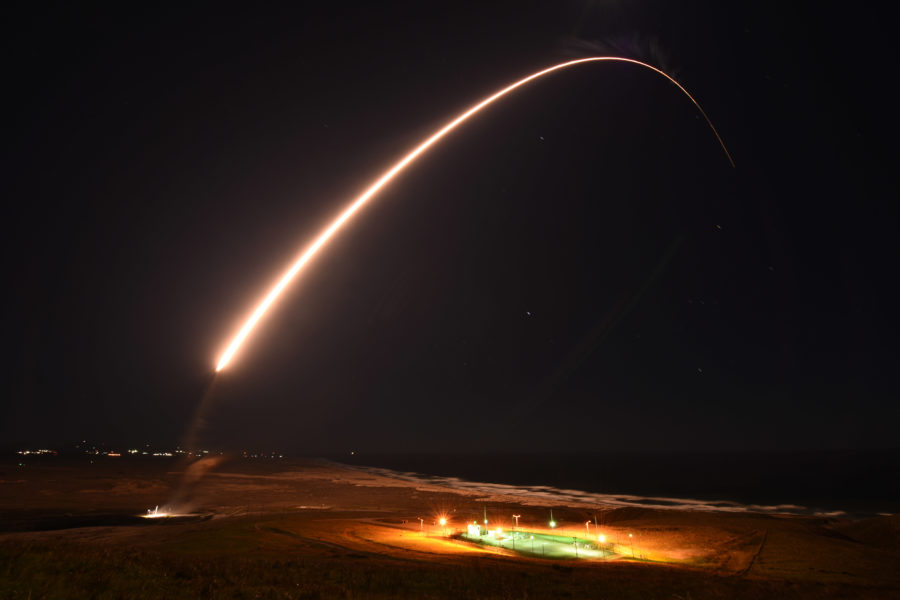The last remaining nuclear arms control treaty between the U.S. and Russia, the New START agreement, is in peril following a declaration by Russian president Vladimir Putin that Moscow was “suspending” Russia’s participation in the accord.
The treaty sets a limit of 1,550 strategic nuclear warheads that each country can deploy. In January, the U.S. said that Russia had violated the accord by blocking on-site inspections.
The U.S. had held out the hope that Moscow would fix the violation. But Putin dug in his heels in a Feb. 21 speech in which he linked Russia’s pullback from the treaty to U.S. support for Ukraine. That has left the two sides fundamentally at odds with scant prospects for compromise.
“We’re not going to change our policy on Ukraine because he’s in a hissy fit over the New START treaty,” said Rose Gottemoeller, who was the top U.S. negotiator of the New START treaty and later served as NATO’s Deputy Secretary General from 2016-2019. “That’s just not going to happen.”
Russia has long valued the New START treaty, which entered into force in 2011 and has constrained the nuclear competition between the two sides. President Joe Biden offered to extend the accord until February 2026 soon after taking office and Russia agreed. For years, inspections have been carried out with little problem.
The on-site visits were suspended by mutual consent in March 2020 because of the COVID-19 pandemic. But when the U.S. sought to resume inspections in August 2022, the Russians balked. Sharp differences over the Russian invasion of Ukraine have cast a shadow over the agreement ever since.
In a statement following Putin’s remarks, the Russian Ministry of Foreign Affairs assailed the U.S. for imposing economic sanctions on Moscow and providing military support for Ukraine in response to Russia’s invasion of the country. Or as Russia put it, the U.S. has sought the “political and economic strangulation of our country.”
In suspending its participation in the treaty, Putin made clear that Russia would continue to refuse inspections. But Russia’s Ministry of Foreign Affairs said that it would continue to observe the treaty’s ceilings on strategic nuclear warheads and the missiles and bombers that are used to deliver them. Russia will also continue to notify the U.S. of ballistic missile launches.
It is not clear if Russia will continue to exchange data on its nuclear forces or notify changes in the status and location of strategic weapons, as the treaty requires.
A greater problem concerns the prospects for negotiating a follow-on accord for New START after the treaty expires.
After Putin’s announcement, Secretary of State Antony Blinken said that the U.S. is “ready to talk about strategic arms limitations at any time with Russia irrespective of anything else going on in the world or in our relationship.”
But some long-time arms control advocates say that negotiating a new treaty will now be harder than ever.
“This attitude on the part of the Russians not to engage on New START and to suspend implementation means that negotiating a new agreement to supersede New START is going to be exceedingly difficult,” said Daryl Kimball, the executive director of the Arms Control Association. “It makes it more likely that after New START expires, there will not be limits on the world’s two largest arsenals for the first time since 1972.”
Lawmakers on both sides of the aisle strongly criticized Russia’s actions.
“The Biden administration should declare Russia to be in ‘material breach’ of the New START Treaty and direct the Joint Staff and U.S. Strategic Command to accelerate planning in the event Russia breaches New START caps,” said Mike Rogers (R-Ala.), the chairman of the House Armed Services Committee.
America must not accept Putin’s gambit, some members of Congress cautioned.
“I vehemently condemn his announced ‘suspension’ of Russia’s participation in New START—the only arms control agreement between Russia and the United States that remains in force—possibly heralding the end of strategic arms control, which for more than fifty years has stabilized our nations’ nuclear relationship,” said Sen. Bob Menendez (D-N.J.), the chairman of the Senate Foreign Relations Committee. “As we work to avoid such a dangerous outcome—and resulting nuclear arms race—Putin and his cronies should have no doubt that the United States will defend our country and our allies, continuing to support Ukraine for as long as it takes to prevail.”

